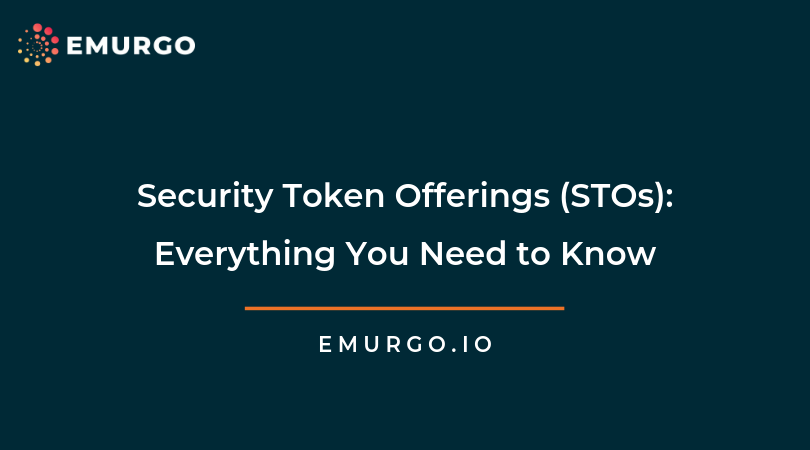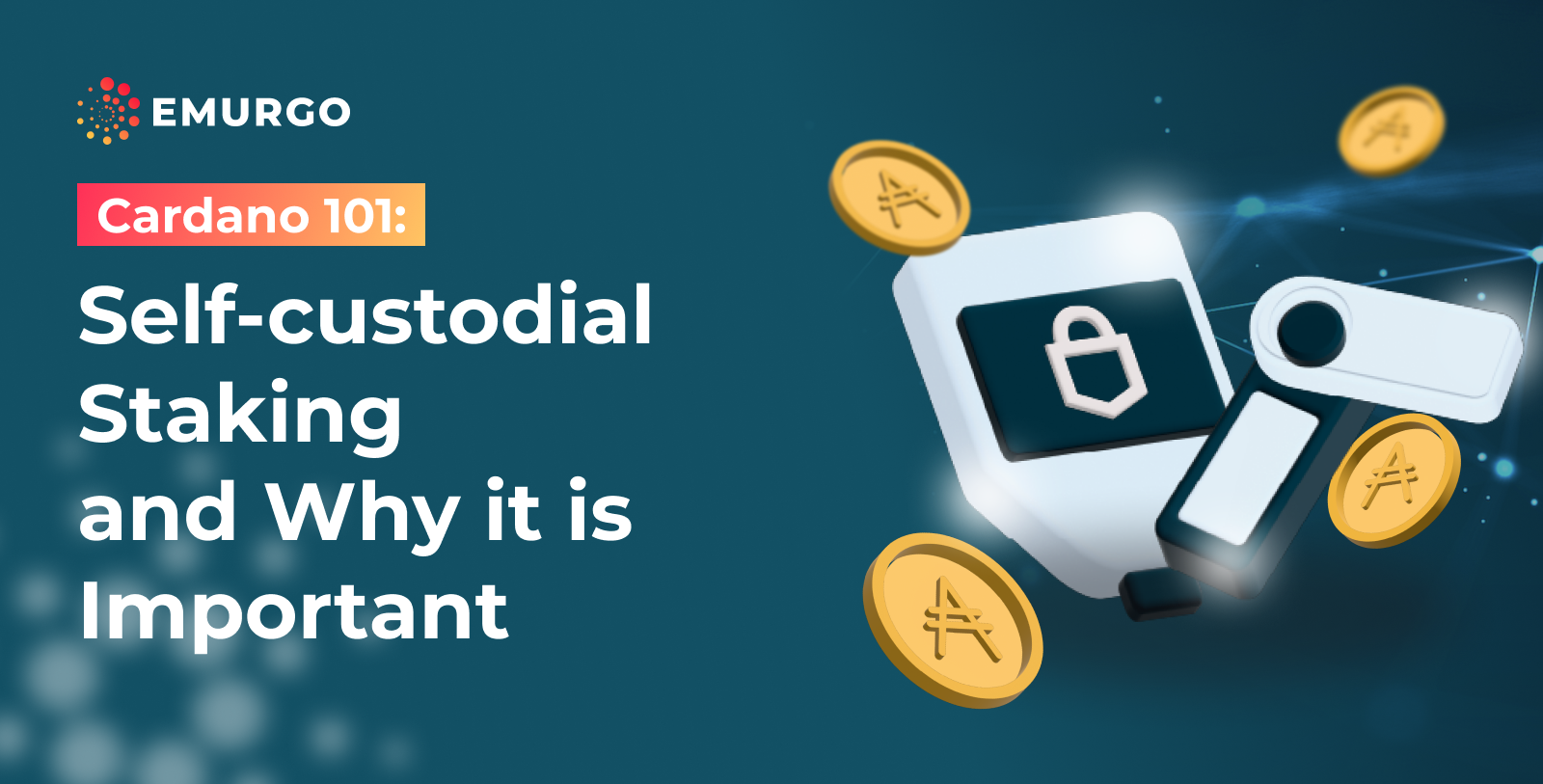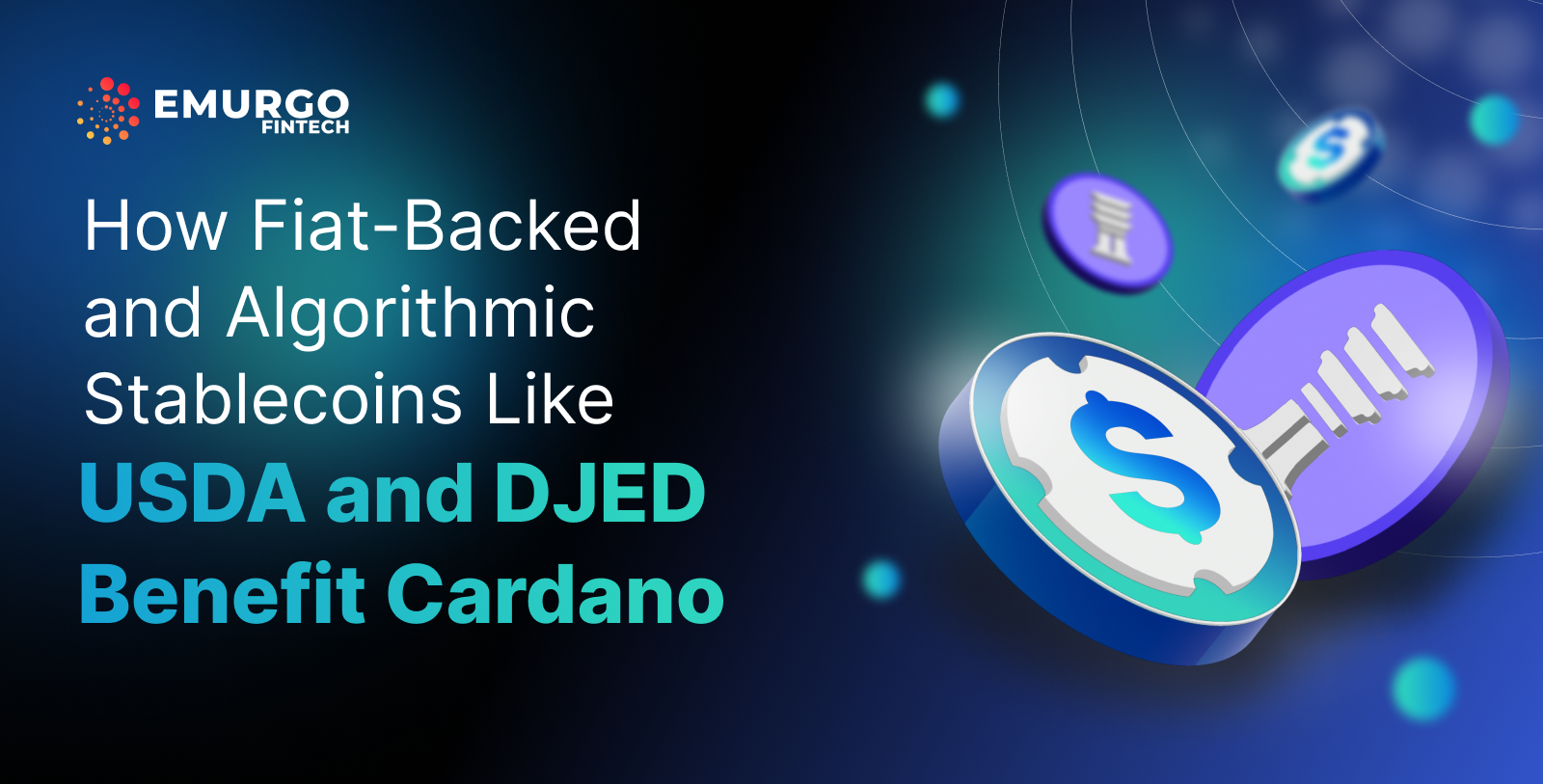EMURGO as the official commercial arm of Cardano, has steadily been gaining a strategic foothold for the upcoming era of Security Tokens & Security Token Offerings (STOs), as STOs display tremendous synergy and align with the value proposition of Cardano (ADA) – a scalable, sustainable, and interoperable third-generation blockchain with a research-first driven approach.
Thus, EMURGO has consistently been in the public view speaking on the future of STOs at numerous leading blockchain conferences including Japan Blockchain Conference, DC Blockchain Summit, and Taipei DLT 101, among other conferences, to raise awareness about the utility potential of STOs on Cardano, and EMURGO’s end-to-end offering of professional advisory services to help enterprises explore offering security tokens on Cardano in the near future.
Furthermore, EMURGO is directly engaging with government policymakers and staying up to date about the latest developments in the blockchain & security token space by joining the U.S. Chamber of Digital Commerce as an Executive Committee member & a founding member of the Blockchain For Europe. Both of these recent developments are intended to share Cardano & blockchain-related information resources with blockchain projects, enterprises, and lawmakers, to gradually shape pro-blockchain initiatives.
In addition, the team at EMURGO has been working hard to create several helpful articles to inform the public about STOs, blockchain and tokenization, and their potential use case values. In this piece, we will summarize all you need to know about the complete basics regarding security tokens and STOs in one simple format.
What is a Security Token? What is a Security Token Offering (STO)?
A security is simply an investment contract. In the United States, a test called the Howey Test sets out what exactly is an investment contract. An investment contract is when:
1. There’s an investment of money.
2. There’s an expectation of profit.
3. The investment of money in a common enterprise.
4. Any profits created rely on the efforts of a 3rd party.
Real-world assets can be represented on the blockchain as digital tokens and then sold as these investment contracts or securities. Real estate, intellectual property, stocks, and many other assets can all be represented through digital tokens on a blockchain. This allows investors the chance to profit from the entrepreneurship and hard work of others.
Thus, security tokens, are classified as financial products, meaning that they are regulated according to similar rules as securities (many countries use systems similar to the Howey Test for classification). Backed by tangible assets, they represent a share in profit, dividends, interest, or some other expected financial gain. They are regulated by the regulatory bodies that govern financial securities, and require compliance with financial securities law, approval, and/or licenses to be sold.
A Security Token Offering or STO is simply an offering to investors of these digital security tokens. The offering can be public and/or private and represent the digital tokenization of some tangible asset on a blockchain to be offered to a wider group of investors.
Security Tokens vs. Utility Tokens: What Is The Difference?
In simple terms, a utility token is a blockchain-based asset people buy with the intention to use for something in the future. As a simple example, a company developing an online game could issue utility tokens to fund the development of the game. Once the game’s development has finished, the token owners could then use the tokens for in-game purchases. The game developers gain access to capital to fund their project, and gamers access in-game tokens for future use. Utility tokens are used for services on a blockchain-based platform or application.
Utility tokens are often confused with security tokens where the intended purpose is not clear. A security token is purchased by someone as an investment to reap gains. The buyer of the security token does so with the expectation of profit. For the value of a security token to increase, the investor relies on a third party. For a security token representing real estate for example, the real-estate developer would be expected to increase the value of the investment for the token holder.
Unlike a security token, utility tokens are not bought with the intention of return on investment. They are simply bought to be used (utility) rather than see an appreciation of value. Utility tokens have functionality baked into their core. Because of this, there is a wide spectrum of use cases for utility tokens with one clear example noted above. A utility token can do many different things and has many different applications.
Why Security Tokens? What Are The Potential Benefits & Challenges?
Security tokens are still gaining awareness in the nascent blockchain industry, let alone in traditional financial circles. However, the potential for security tokens (tokenization of securities) is unlimited due to the early nature of the industry.
For starters, compliance has traditionally been a headache in finance. Actions such as selling or transferring shares of a company to another individual may require many compliance steps. The blockchain offers not only an immutable way to keep track of ownership, but also allows for the streamlining of compliance by hard-coding restrictions and rights directly into the smart contract of the security token. Examples of potential programmable compliance include lockup periods and identity verification requirements. As compliance is further automated, the costs of primary issuance and secondary trading and transfers will likely drop significantly.
Other advantages of security tokens include automated dividend distributions, simple proxy voting, fractional ownership of high-value assets, increased liquidity with no closed market hours, and a flexible nature. Startups would be able to have another secure and transparent method to crowdfund their potentially profitable businesses to a wider group of investors.
Thus, security tokens offer an invaluable flexible structure, which companies can leverage to offer unique securities that suit their specific needs. For example, companies may offer a share in future profits, but may not back the token with other rights carried by shareholders in the company. Or a company could structure a security token backed by a share in profits of a single product line within the company. Or a company may choose to back the security token with debt, such as a convertible note, but with fractional ownership, meaning that retail investors can participate in the ownership of a 100K note.
The potential for security tokens is endless.
Yet, the STO markets and accompanying underlying infrastructure won’t be built in a day – or even a year. The negative connotations of the ICO (initial coin offering) boom and bust still haunt the STO markets and investor perceptions tend to change slowly.
To prove that STOs are not part of the ICO “Wild West,” the blockchain industry needs to have regulatory clarity that is pro-blockchain and build trust capital by removing bad actors and scams from the space.
Conversely, the regulatory clarity that many investors are waiting for is also one of the main reasons that blockchain adoption is taking time. Regulations rarely change overnight, especially given the abstract and highly technical nature of blockchain technology and its potential to revolutionize traditional industries central to the economies of nations.
However, the blockchain industry has continued to march forward, attracting top talent to build useful projects, spreading awareness at conferences and with media & policymakers, releasing consistent updates, and so forth. It’s only a matter of time before security tokens and tokenization start to make bigger inroads into the mainstream.
What are ICOs? IEOs? IPOs?: Comparing ICOs vs. IEOs vs. IPOs
Initial Coin Offerings (ICOs) and Initial Exchange Offerings (IEOs) are both offerings of digital blockchain-based tokens to a wider group of investors, either in a public and/or limited fashion. Both are more geared towards the offering of utility tokens as regulations are clearer regarding utility tokens at this point in time.
In an ICO, a token-issuing project will issue their native utility tokens to investors participating in their ICO. Usually done in several rounds and certain “discounts,” investors will send a designated cryptocurrency to the token-issuing project in return for the project’s native utility token. Due to the boom and bust of the ICO phenomenon in 2017, some ICOs have gained a certain stigma for lacking quality control while other projects have used the raised funds to start building quality projects.
In an IEO, a token-issuing project will list their utility tokens on a cryptocurrency exchange with the users of that exchange enjoying quicker access to those tokens at an earlier point in time with the implied vetting done by the exchange. The project gains access to a wide group of users and in theory, more liquidity up front. IEOs currently offer a quick path to the sale and distribution of utility tokens, while potentially raising significant funds for the project. However, projects and investors are susceptible to the allure of flashy marketing and big promises and should carefully study the viability of the token model and the plans or likeliness of the project to achieve significant adoption.
ICOs and STOs offer alternatives to the traditional IPO model. With over 400 years of history, the IPO has been the dream of most startups across the globe. IPOs offer a predictable, established method of fundraising with a mature ecosystem and solid infrastructure. However, earlier stage companies have been excluded from the IPO model, with only profitable (or high revenue) companies able to participate in offerings to the public. Compliance costs, regulatory standards, the need for third party services, and revenue stream, are some of the high barriers to an IPO.
What’s The Current Status on STOs?
As of today, security tokens and tokenization of assets are still in their nascency. Nevertheless, the future potential for digital tokenization is largely untapped and its growth can become exponential according to the size of the addressable markets. Awareness of STOs and implementation of blockchain technology is increasing gradually and in some places, very rapidly.
Currently, the total market capitalization for digital assets stands at approximately $280 billion (as of writing). [1] The entire market capitalization of the world’s equity/stock markets stands at nearly $70 trillion with the world’s total physical supply of money (coins, notes, checking, savings) at $37 trillion. Thus, there is an enormous potential for growth in tokenization of the world’s equity markets and supply of money.
The digital securities market, like any new market, faces the challenge of balancing adoption with the development of infrastructure and the navigation of existing laws and regulations. As legislators define the rules surrounding digital securities and Security Tokens, and an efficient ecosystem is built and tested by first movers, adoption will follow.
To gain further regulatory clarity, the blockchain industry must limit bad actors and scams by upholding standards, continue to drive awareness of the utility of security tokens, educate developers, and build the ecosystem with products of real value.
The good news is that governments are gradually learning more about the state of security tokens and blockchain overall. Quality standards are improving with useful products coming out consistently to drive a blockchain-based future.
Cardano as the first, third-generation blockchain to evolve out of a research-first driven approach is built by a large collective team of professionals with the mentioned needs of governments, enterprises, institutions, and developers in mind.
What’s EMURGO’s Role With STOs on Cardano?
Alongside the numerous speaking appearances at leading conferences and entry into government-affiliated blockchain associations, EMURGO has also directly invested and partnered with Y2X – a leading digital merchant and investment bank that will help entrepreneurs raise capital for expansion through Securities Token Offerings and other means. Cardano will become the protocol of choice for Y2X and its portfolio firms, especially in the field of regulated STOs, therefore providing an increased value add to ADA holders. Y2X’s co-founders J. Todd Morley & Dave Shuler, come from established backgrounds in finance on Wall Street, together bringing a wealth of professional expertise and global networks to build the platform.
EMURGO also continues to provide end-to-end advisory services to enterprises wishing to implement blockchain-based solutions & tokenization into their existing verticals with an eye towards Cardano as the protocol of choice.
So What’s Right for Your Project?
EMURGO – the official commercial arm of Cardano – can help you decide what is best for your company and users. We are looking forward to hearing what you’re working on! One of EMURGO’s main business units is general advisory services. Our expert team is ready to offer an assortment of tailored blockchain consulting services for your enterprise or project and for token economics missions.
Please reach out to us here and our consulting team will get back to you.

EMURGO drives the adoption of Cardano and adds value to ADA holders by building, investing in, and advising projects or organizations that adopt Cardano’s decentralized blockchain ecosystem. EMURGO leverages its expertise in blockchain R&D as well as its global network of related blockchain and industry partners to support ventures globally.
EMURGO is the official commercial and venture arm of the Cardano project, headquartered in Singapore, with a presence in Japan, the USA, India, and Indonesia. EMURGO works closely with IOHK and The Cardano Foundation to grow Cardano’s ecosystem globally, and promote its adoption. Learn more about the project at https://dev.emurgo.io
Follow EMURGO on Social Media
・Official Homepage: dev.emurgo.io
・Twitter (English): @emurgo_io
・Twitter (Japanese): @Emurgo_Japan
・Youtube: EMURGO
・LINE: @emurgo
・Telegram: EMURGO Announcements
・Facebook: @dev.emurgo.io
・Instagram: @emurgo_io
・LinkedIn: @emurgo_io
About Yoroi Wallet
・Yoroi Twitter: @YoroiWallet
・Yoroi Homepage: https://yoroi-wallet.com/



